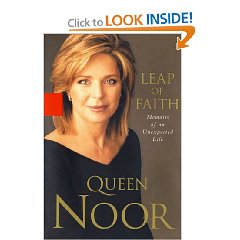The true beginning of the book comes on page 32, when the author, then a student at Princeton, learned of the death of four students and injury of nine students at Kent State University at the hands of an undisciplined Ohio National Guard armed with real bullets. Most Americans over 40 will never forget the photo of the young woman kreening over one of the dead. That shooting leads to the following sentence in the book: “It was a seminal moment in shaping my view of American society. While I loved my country, I found my trust in its institutions badly shaken.”
The value of the book for me is in the author's credible discussion of what she calls “a fundamental lack of understanding in the West, especially in the United States, of Middle Eastern culture and the Muslim faith.” I took the entire book on faith myself–while rabid Jews may not agree, I am prepared to believe that Queen Noor has not been brainwashed, and that she is offering all readers a personal perspective on Arabs, Muslims, Israel, the Gulf War, the impact of US policies in creating millions of refugees and tens of thousands of dead, and so on. If anything, the book, one of hundreds I have read in the past several years, confirms my growing sense of ignorance. Every additional book I read in this area seems to confirm how little any one person can know, and how duplicitious and misleading most official accounts, or media stories, are. We have a long way to go in truly understanding one another, and we can all start by a) reading and b) discussing. Attacking this book, and this Queen, is not helpful.
Although I was was somewhat aware of the fact that Israel is in violation of United Nations resolutions calling for a separate and equal Palestine state, as well as compensation to the Palestinians driven from their lands and also are of the somewhat rocky start in the area from British mandates and Israeli terrorism utilized to drive the British from the area, I was unaware of Mahatma Ghandi's statement, “Palestine belongs to the Arabs in the same sense that England belongs to the English or France to the French. What is going on in Palestine today cannot be justified by any moral code of conduct.”
The bulk of the book is less about affairs of state than it is about the loneliness of a Queen whose husband is public property and who never has any privacy. It is, none-the-less, an absorbing personal account of many specific people and their ethics–one comes away dismayed that Barbara Bush would send word to Queen Noor that she was a traitor to America, and pleasantly surprised to find that Prince Charles proved to be the only balanced courteous English leader at a critical time.
At the end of the book, and this no doubt explains the hysterical Jewish attacks against this Queen, mother, and author, I was persuaded of three things: 1) the US public and the US government does not have a good grip on Arab politics, culture, or needs; 2) the combination of Jewish power within US policy; Arab inattention to playing US politics from within; and the Zionist “myths” that take on a life of their own, are a major reason why US policy is ineffective and unsustainable in the long run within this vital area; and 3) Queen Noor was as good a queen as the Jordanian people could have hoped for, given the circumstances. This book was well worth my time, and I recommend it to every citizen who wishes to reduce conflict, increase understanding, and obtain a better return on how the U.S. taxpayer dollar is spent.





